
views
- Take deep breaths and relax your muscles to get rid of nervousness fast. Squeeze your muscles tight before releasing all your tension.
- Put your nervous energy into a productive task, like cleaning or organizing, so you can distract yourself.
- Visualize a positive, calming image, like a sunny beach or a quiet peaceful forest. Try to imagine all the sounds and sensations in your happy place.
- Put on a calm, relaxing song or one that you can sing along with. Focus on the music to get your mind off of any nervous thoughts.
Take a few deep breaths.

Deep breaths slow down your heart rate so you calm down. If you’re feeling nervous right now, take a moment to stop what you’re doing and close your eyes. Sit or stand up straight, and breathe in deeply through your nose. Hold your breath for a few seconds before exhaling through your mouth. Keep taking deep breaths until you feel you feel relaxed again. Take a few minutes before a big speech or presentation to just sit and breathe so you can feel the most relaxed before you start. Breath with your belly. Breathe in so that you belly moves forward, and breathe out pressing your belly back. Try to clear your mind and just concentrate on your breathing. Put your hand on your stomach and focus on the feeling of your lungs filling with air to distract yourself. Incorporate deep breathing exercises into your daily routine. Practice taking deep breaths 2–3 times a day for about 3 minutes at a time.
Relax your body.

Releasing tension in your body will help you eliminate nervous energy. Try to find a quiet spot so you can focus on doing progressive muscle relaxation without getting interrupted. Start by curling your toes. Keep your muscles tense for 5 seconds, then relax them for 30 seconds. Work your way up through your body, tensing and relaxing the muscles in your legs, core, arms, and back. When you’re finished, your whole body will feel relaxed. Focus on the physical sensations as you tense your muscles. That way it’s easier for you to catch yourself and relax when you’re involuntarily holding in tension and nervousness.
Give yourself a massage.
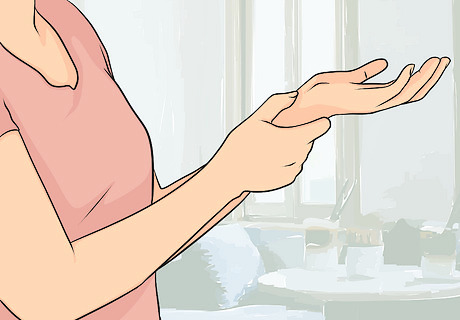
A quick and soothing self-massage makes you more relaxed. Give yourself a massage by kneading your muscles with your fingertips. Just press down with light pressure and move your fingers in tiny circles. Focus on spots like the base of your neck, shoulder, scalp, and jaw muscles since that’s where you hold a lot of tension. To make your massage the most relaxing, rub some aromatic oil or scented lotion into your skin.
Meditate.
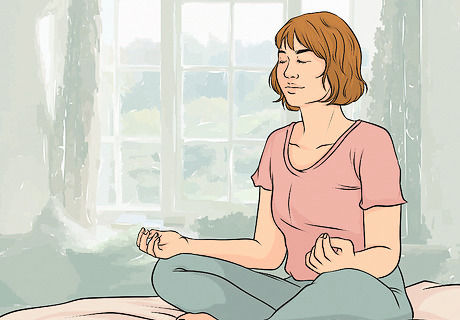
Meditating makes you focus on the present instead of your nerves. Even just a few minutes of meditation each day can help to ease your anxiety and nerves, and let things that worry you roll off your shoulders. Start by simply placing both feet on the floor and sitting up straight. Close your eyes and focus on your breath, or repeat a simple, meaningful mantra so you can let all your nervous thoughts and energy drift away. Try coming up with a positive mantra that helps you focus, such as “I am at peace” or “I am strong enough to get through this.” It’s completely normal for your mind to wander when you first start meditating. Our brain is active and full of thoughts, so it may be difficult to focus. When it happens, redirect your thoughts back to your breathing or your mantra.
Redirect nervous energy to another activity.

Refocusing on a new task can distract you from your nervousness. If your nerves are making you feel antsy, use that energy to get something else done. Take a few minutes to tidy up your room, sort through your emails, or go through a self-care routine to take your mind off of anything you’re worried about. You’ll feel so much more relaxed burning your energy doing something productive rather than sitting with your anxiety. Example: If you’re feeling nervous in the morning before you go to school, use your energy to clean up your room and make your bed before you go.
Visualize a calming picture.

Picturing relaxing images tricks your brain into feeling less nervous. Whenever you feel nervousness building up, take a few moments to close your eyes and visualize something soothing. It could be a happy childhood memory or a relaxing place where you feel safe, like a quiet beach with a calm sea. Imagine the sights, sounds, and feelings of your happy place, and you’ll feel your stress melt away. Example: If you’re visualizing a beach, imagine the calming sound of the waves, the feeling of hot sand between your toes, and the smell of the ocean air. It’s okay if you get distracted as you’re trying to visualize. Whenever you lose focus, just gently remind yourself that you should be in your happy place and let your worries pass you by.
Listen to soothing music.

Playing your favorite songs can make you less stressed and anxious. Pop on some headphones and put on some slow, mellow music or nature sounds to calm down. Close your eyes and just focus on the music to help boost your mood. Even jamming out to your favorite uptempo tunes and singing your heart out along with it can help you burn that nervous energy. If you’re going to a new school, put on your favorite song on the way there so you can pep yourself up.
Journal about how you’re feeling.
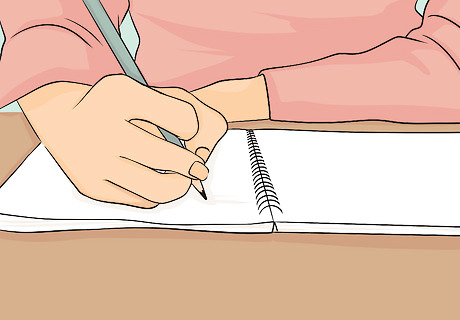
Writing down your nervous thoughts helps you work through them. Any time something makes you feel nervous, jot down what happened and why you’re feeling that way. Write down whatever comes to mind without a filter so you can process how you’re feeling. When there’s a similar situation making you anxious in the future, look back in your journal to remind yourself how you handled it last time. Keeping a journal is also a good way of tracking the things that make you nervous. Looking back on something you overcame that stressed you out in the past can offer some much-needed perspective.
Rehearse difficult situations ahead of time.
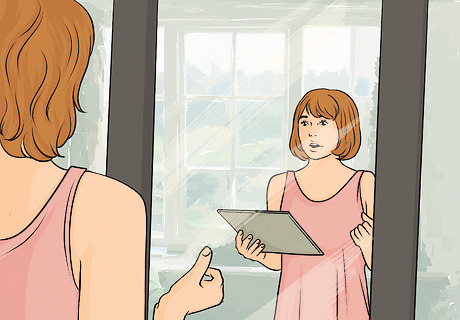
Practicing what you want to do or say builds up your confidence. If you have to speak in public, give a presentation, or prepare for a job interview, practicing can help make the event seem more familiar. Start by practicing in front of a mirror to lock down what you want to say. When you feel like you’re ready for an audience, try rehearsing common interview questions or giving a presentation to a friend or family member you feel comfortable around. You can even practice for awkward conversations, like if you want to talk to your roommate about leaving dirty dishes in the sink. Rehearse what you want to say privately and then address your roommate with confidence. If you get nervous during social interactions, try rehearsing some small talk topics or learn a few jokes you could use to break the ice. Beyoncé Knowles Beyoncé Knowles, Singer & Businesswoman If you experience nerves, channel them so that they fuel you. "I think it's healthy for a person to be nervous. It means you care – that you work hard and want to give a great performance. You just have to channel that nervous energy into the show."
Expect positive outcomes from stressful situations.

A positive mindset makes you focus on what can go right. It’s completely normal to feel nervous about what could go wrong, but try to challenge your thoughts and consider what could go really well. Imagine what the best possible outcome could be and picture it happening. The positive imagery will give a boost to your confidence so you’re not feeling as anxious. Example: If your boss asks you to come to their office, the best outcome may be that they’re really happy with your work and they’re telling you that you’ve done an amazing job. Remember that things don’t have to go absolutely perfect to have a positive outcome. Even if something doesn’t go the way you planned it, look for the bright side.
Allow yourself time to feel nervous during the day.
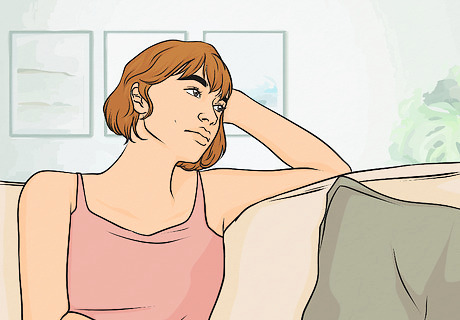
Scheduling a little time to embrace your nerves helps you focus during the day. Nervousness and anxiety are perfectly normal, so it’s okay if you feel them from time to time. Give yourself 10–15 minutes every day where you can sit and worry about anything that’s on your mind. When your worry time is over, focus your energy on other tasks. Example: If you have an interview tomorrow, set aside a couple minutes to address what’s making you feel anxious. After 10 minutes, you can practice everything you just thought about to put your best foot forward.
Confront your fears gradually.
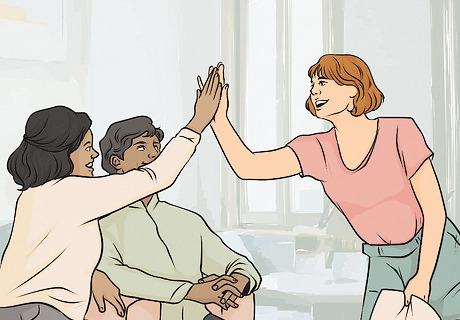
Taking baby steps toward your fears makes you less nervous about them. Avoiding things that make you nervous may only make you more fearful of them in the future. Rather than embracing your fears head-on, start exposing yourself to your fears slowly so you can get used to them. As you start feeling more confident, don’t be afraid to keep trying new things. Example: If you’re nervous about socializing at a big event, start by chatting with someone you know and ask them to introduce you to other people. Example: If you’ve got nerves about a presentation you need to give, start by practicing in front of 1 or 2 friends before presenting to a larger group.
Talk with friends or family.
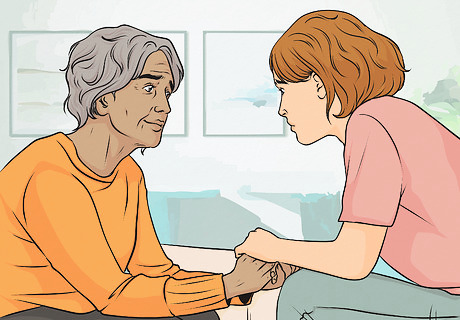
Your loved ones are here to support you when you’re feeling anxious. Rather than keeping your feelings bottled up, reach out to someone that you trust and let them know how you’re feeling. They might be able to offer you some helpful advice if they’ve been through a similar situation, but even just talking about your nerves can help alleviate them. Example: If you’re nervous about going to the dentist, bring it up to someone you know. They may have some helpful tips or they may be able to come with you to show you that there’s nothing to worry about.
Limit your caffeine intake.
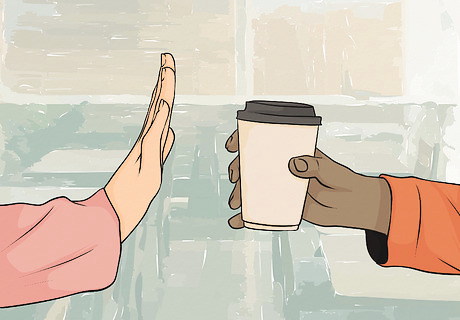
Too much caffeine can make your nervousness more noticeable. Caffeine can give you more energy, but it can increase your anxiety as well. Gradually try to cut down on your caffeine intake. Consider keeping a caffeine diary for a few days to document how much you consume and work on reducing the amount you have over a few weeks. Try replacing your regular caffeinated drinks with decaf teas and coffees. Cutting caffeine completely from your diet can also make you feel nervous, so take your time to ease off of caffeine if you want to quit it.
Get plenty of sleep.
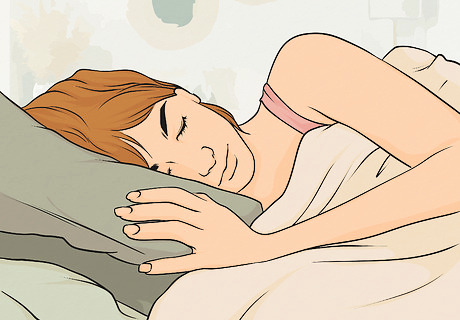
A lack of sleep can increase your anxious and nervous feelings. Aim to get between 7–9 hours of sleep per night so you can feel well-rested and ready for the day. Do your best to stick to a consistent sleep schedule so you can develop a healthy routine. When you’ve got enough sleep and energy, you’re less likely to feel stressed out by normal day-to-day life. If you’re nervous about an exam, try not to stress and cram late into the night. A good night’s sleep will help you focus and feel better when it’s time for the test. To ensure a good night’s sleep, try a relaxation exercise before bed. Deep breathing, stretching, and progressive muscle relaxation can all help.
Eat a healthy, balanced diet.

Eating healthy foods helps your body naturally process stress. A good healthy diet will help provide you with all the minerals and nutrients you need to stay healthy and active. A poor diet can lead to fluctuating blood sugar levels, which could produce bodily sensations similar to anxiety. Skip sugary, fried, or processed foods, and focus on eating a variety of whole-wheat grains, vegetables, and fruits. Cut back on alcohol since it’s a depressant could make you feel more anxious.
Get regular exercise.

Staying active burns off nervous energy in your body. When you work out, it tires out your muscles and gives you a natural way to lower your anxiety levels. Try to incorporate 30 minutes of physical activity into your daily routine to manage your nervousness and build up your confidence. Just taking a brisk 5-minute short walk can help to relieve anxiety. Getting outside in the fresh air can also have a refreshing and rejuvenating effect.
Talk to a doctor if your nerves interfere with daily life.
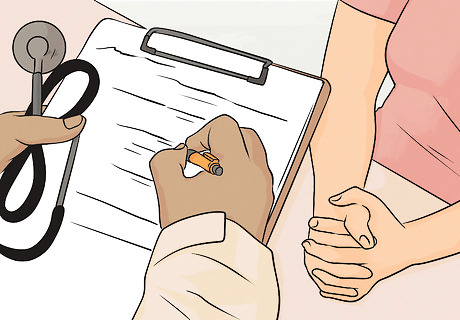
Persistent nervousness may require additional treatment or medication. If you’ve tried all of these tips and you still have trouble finishing your daily tasks without feeling nervous, make an appointment with your doctor. Be honest with them about how you’re feeling and discuss what possible treatment options they have to offer. For mild nervousness, your doctor may just recommend lifestyle changes, such as more exercise and a better diet. If you’re feeling really nervous, your doctor may recommend going to therapy to help you manage stressful situations better. Your doctor may prescribe anti-anxiety medications to help you control your symptoms. Talk about the different options with your doctor to see what they recommend.













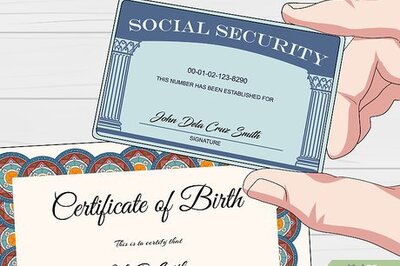


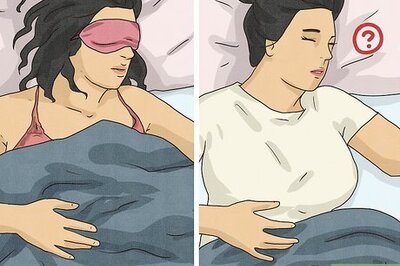

Comments
0 comment